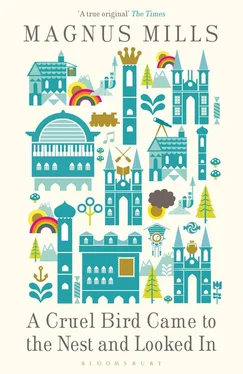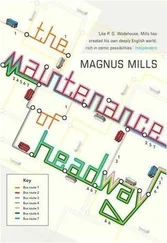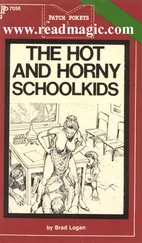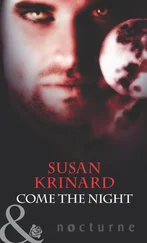Eventually, with the final symphony approaching, I began to wonder what we were supposed to do when the festival was over. Hopefully there were many future programmes in prospect, but the City of Scoffers was now in the depths of winter and I had a feeling they wouldn’t come to fruition until the spring. The skies darkened and the days were cold. New arrivals at the central station appeared half-perished, yet still they kept pouring in. The city’s flags fluttered and became ragged in the bitter easterly wind.
For the time being, though, life remained satisfactory. After all, the concert hall was comparatively cosy. Soft pink chandeliers glowed all day long while the orchestra rehearsed, and Greylag was as fully absorbed as ever. The ninth symphony was the longest of the works he was performing; hence he spent many hours labouring over its four movements. Then, at last, he was ready.
Tickets for the closing concert had been sold out days earlier. On the evening of the performance there were crowds gathering at the door long before dusk. Sanderling was there keeping order and telling people what they already knew: that this was their cherished composer’s most well-known symphony. Finished only days before he died, it was generally considered his departing masterpiece. The anticipation of the audience was palpable. By eight o’clock we had them all sitting comfortably inside. The orchestra was waiting; the lights were dimmed and Greylag made his entrance. At the last moment a latecomer sidled into the only empty seat. Sanderling and I took up our positions standing at the rear of the house.
I sometimes thought Greylag was rather cruel in his assessment of this composer. While I was quite aware of his own exacting standards, it seemed to me that he gave insufficient quarter to rival composers, especially this one. As I stood listening to the ninth symphony I heard only pleasant tunes, dynamic phrases and an overarching theme that was hardly forgettable. Sadly, I concluded that Greylag’s years in serfdom must have shaped his opinion of others.
By now the symphony was moving towards its finale. I knew from rehearsals that it didn’t end with a climactic eruption as with most similar works. Instead the fourth movement petered out quietly, leaving the listener to reflect on what had gone before. When the last notes faded away the audience sat in silence for a few seconds; then they responded with thunderous applause. Greylag turned towards them, bowed, and left the podium.
Hitherto during the festival there had been no encores. Apparently they weren’t customary in the City of Scoffers. I had witnessed the occasional standing ovation, usually after the more famous pieces, but that was more or less the extent of their enthusiasm. These were serious people: they were not given to prolonged bouts of floor-stamping.
Tonight, however, was different. Maybe it was because the music had been so powerful, or simply that this was the final performance of the festival: whatever the reason, the audience demanded an encore. The applause continued unabated until Greylag reappeared at last. He even received a muted cheer from one or two people down at the front. Then everyone fell silent.
Evidently he’d chosen the purest course of action: he proceeded to play the fourth movement once again. This was most agreeable. We’d only heard it a few minutes before, yet in Greylag’s hands it sounded as fresh as if it had just been written. Towards the end, though, some sort of change had been made: not to the music itself, but to the instrumentation. The main theme from the first movement had returned and the whole orchestra was in full flight when suddenly all the cellos stopped playing. As the other musicians continued, the cellists packed away their instruments and left the arena. After a few more bars, the entire brass section did exactly the same thing; but Greylag went on conducting as if nothing had happened. I glanced at Sanderling and he raised his eyebrows; then we carried on watching in fascination. Slowly but surely, different parts of the orchestra began to disappear, each musician carefully putting his instrument in its case prior to departing. The oboes went next, then some of the percussion, then the rest of the woodwind. The dwindling orchestra played on as the symphony’s conclusion drew gradually closer. Soon there were only a half dozen violins remaining; then three; then only two. In the original piece the entire ensemble had delivered the last few bars very quietly. This time we were carried to the end by a lone violin. He finished playing and packed away his instrument. Then he, too, vanished. Finally, Greylag turned to the audience, gave a bow and left his podium.
Fortunately, the onlookers took it all in good humour. After an initial stunned silence they began clapping again, louder and louder, until genuine applause had fully returned. Clearly they viewed it as an interesting diversion with no added connotations.
Yet from where I stood the message was obvious. I leant over to Sanderling and spoke in his ear: ‘Greylag wants to go home.’
Once the crowds had departed, I went into the auditorium to sweep up the discarded tickets. I expected the place to be empty: most people had trains to catch and stragglers were unheard of in the City of Scoffers. I was doubly surprised, therefore, to see Wryneck sitting in one of the seats. He was lounging at the back of the stalls, and appeared to be scrutinising the arched ceiling.
When he caught my gaze he nodded.
‘The acoustics here are far superior to those in the cake,’ he remarked.
‘Yes,’ I said, ‘I don’t doubt it.’
He rose from his seat and began strolling around the auditorium. He peered at the pink chandeliers and classical decor. Then he went up to the grand tier and examined the quality of the upholstery. Finally, he mounted the conductor’s podium. He stood for a moment conducting an imaginary orchestra before joining me in the stalls.
‘This is the standard we’ll be seeking when the cake is restored,’ he announced.
Wryneck spoke as if we were continuing a conversation we’d broken off only a few minutes earlier, rather than renewing an acquaintanceship after several long weeks, but this was typical of him. He rarely bothered with such trifles as saying hello.
‘Enjoy the concert, did you?’ I asked.
‘Excellent,’ he replied.
‘How did you manage to get a ticket?’
‘On the black market.’
‘I didn’t know there was one.’
‘Oh yes,’ he said, ‘you can buy anything here if you have the money.’
Despite Wryneck’s supercilious manner I was quite pleased to see him again. He was wearing his dandy coat, and the sight of it brought back memories of life in Fallowfields. I thought fondly of Whimbrel pottering around in the observatory; of Gallinule and his companions drinking in the Maypole; and of glorious sunlit evenings in the great library.
‘How’s Smew?’ I enquired. ‘Does he still have lemon curd for tea?’
‘He’s fine,’ replied Wryneck, ‘but the lemon curd ran out.’
‘Oh dear.’
‘So did the quince marmalade and the fortified wine.’
‘So you’re here for the black market, are you?’
‘No,’ said Wryneck, ‘I’ve come to find that young emperor of ours.’
The emperor! I’d forgotten all about him. His alleged antics at the university had led indirectly to all the recent upheavals: the occupation of the imperial capital; the resulting shortages; the displacement of the orchestra; not to mention my own sojourn here in the City of Scoffers. Yet for some reason he’d completely slipped my mind. It was odd to think that he was playing truant somewhere in the metropolis while the rest of us got on with our lives as best we could. Now, all of a sudden, Wryneck had turned up on a mission to find him and bring him to book. Or at least that was the presumed intention. His tone of voice certainly suggested he’d lost patience with our elusive sovereign. It transpired, however, that Wryneck wasn’t here simply to mete out chastisement. Seemingly, the person of the emperor was required for critical reasons of state.
Читать дальше












